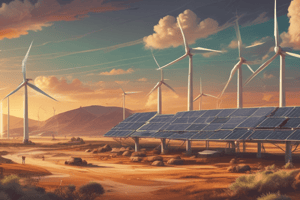Podcast
Questions and Answers
What are two main categories of energy sources?
What are two main categories of energy sources?
- Natural and artificial
- Renewable and non-renewable (correct)
- Chemical and physical
- Fossil and renewable
What is a major disadvantage of solar energy?
What is a major disadvantage of solar energy?
- It generates pollution
- It is dependent on sunlight availability (correct)
- It is not cost-effective
- It is difficult to install
What is geothermal energy considered location-dependent?
What is geothermal energy considered location-dependent?
- It relies on the proximity to tectonic activity (correct)
- It requires specific soil types to work
- It depends on a certain amount of sunlight
- It needs high temperatures to be efficient
What are two benefits of using hydropower?
What are two benefits of using hydropower?
What type of energy is produced from the movement of air?
What type of energy is produced from the movement of air?
What defines biomass energy?
What defines biomass energy?
How does nuclear fission work?
How does nuclear fission work?
What is a major disadvantage of using tidal/wave energy?
What is a major disadvantage of using tidal/wave energy?
How does solar energy generate power?
How does solar energy generate power?
What is the primary use of electrical energy?
What is the primary use of electrical energy?
Flashcards are hidden until you start studying
Study Notes
Definition of Energy
- Energy is the capacity to do work or produce change.
Categories of Energy Sources
- Two primary categories: renewable energy sources and non-renewable energy sources.
Sustainability
- Sustainability involves meeting the needs of the present without compromising the ability of future generations to meet their own needs.
Forms of Energy
- Three forms include kinetic energy, potential energy, and thermal energy.
Environmental Benefits of Renewable Energy
- Reduces greenhouse gas emissions.
- Decreases air and water pollution.
Sources of Non-Renewable Energy
- Three sources are coal, oil, and natural gas.
Fossil Fuels
- Fossil fuels are termed non-renewable due to their finite nature; they take millions of years to form.
Definition of Fossil Fuel
- Fossil fuels are natural substances formed from the decomposed remains of ancient organisms.
Nuclear Fission
- Nuclear fission is a process where the nucleus of an atom splits into smaller parts, releasing a significant amount of energy.
Nuclear Energy
- Nuclear energy is generated through fission or fusion processes, providing a powerful energy source.
Solar Energy
- Solar energy is harnessed from the sun's radiation.
Power Generation from Solar Energy
- Solar panels convert sunlight into electricity using photovoltaic cells.
Benefits of Solar Energy
- Reduces electricity bills and reliance on fossil fuels.
- Low environmental impact during operation.
Disadvantage of Solar Energy
- Intermittent availability; dependent on sunlight.
Wind Energy
- Wind energy is generated through the kinetic energy of wind.
Power Generation from Wind Energy
- Wind turbines convert wind movement into electrical energy.
Benefits of Wind Energy
- Low operational costs and minimal emissions during operation.
Disadvantage of Wind Energy
- Can be impacted by inconsistent wind availability.
Hydropower
- Hydropower utilizes flowing water to generate electricity.
Power Generation from Hydropower
- Dams or water flow turn turbines, generating electricity from kinetic energy.
Benefits of Hydropower
- Provides a stable energy source and can be easily adjusted to meet demand.
Disadvantage of Hydropower
- Potential ecological disruption due to dam construction.
Biomass
- Biomass consists of organic materials used to generate energy.
Power Generation from Biomass
- Biomass is burned or converted into biofuels, releasing stored energy.
Organic Waste for Biomass Energy
- Common sources include agricultural residues, wood, and food waste.
Benefits of Biomass Energy
- Reduces waste in landfills and lowers dependence on fossil fuels.
Disadvantage of Biomass Energy
- Can contribute to deforestation and air pollution if not managed sustainably.
Geothermal Energy
- Geothermal energy harnesses heat from beneath the Earth's surface.
Power Generation from Geothermal Energy
- Heat is extracted from underground reservoirs to produce steam that drives turbines.
Location Dependency of Geothermal Energy
- Geothermal energy is location-dependent due to the need for specific geological conditions.
Benefits of Geothermal Energy
- Low emissions and a reliable energy source with a small land footprint.
Disadvantage of Geothermal Energy
- Limited to regions with geothermal activity, restricting availability.
Tidal/Wave Energy
- Tidal/wave energy is generated from the movement of ocean water caused by tides and waves.
Power Generation from Tidal/Wave Energy
- Turbines or other devices harness kinetic and potential energy from water movement to generate electricity.
Benefits of Tidal/Wave Energy
- Predictable energy generation and minimal environmental impact.
Disadvantage of Tidal/Wave Energy
- High costs and potential effects on marine ecosystems.
Sources of Energy
- Solar Energy: The sun.
- Wind Energy: Atmospheric pressure differences.
- Hydropower Energy: Flowing water from rivers or dams.
Types of Energy
- Mechanical Energy: Energy associated with the motion and position of an object.
- Chemical Energy: Potential energy stored in chemical bonds.
Chemical Energy Storage and Release
- Chemical energy is stored in the bonds of molecules and released through chemical reactions.
Primary Use of Electrical Energy
- Electrical energy is mainly used for powering homes, industries, and electronic devices.
Causes of Heat Energy Flow
- Heat energy flows due to temperature differences between objects.
Light Energy
- Light energy is the energy from electromagnetic radiation that is visible to the human eye.
Sound Energy Production
- Sound energy is produced by vibrating objects that create sound waves.
Magnetic Energy Creation
- Magnetic energy is created by magnetic fields generated by moving electric charges.
Energy Efficiency Calculation
- Energy efficiency is calculated by comparing the output of useful energy to the input of energy.
Studying That Suits You
Use AI to generate personalized quizzes and flashcards to suit your learning preferences.





